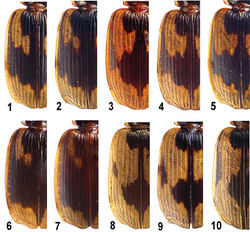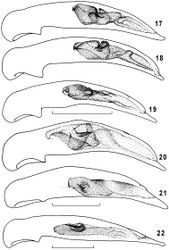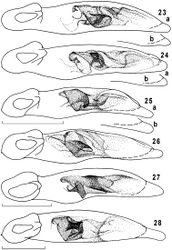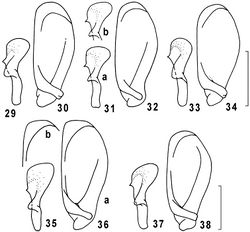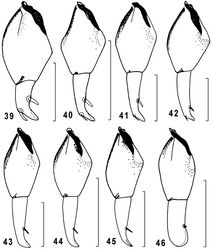Taridius abdominalis
| Notice: | This page is derived from the original publication listed below, whose author(s) should always be credited. Further contributors may edit and improve the content of this page and, consequently, need to be credited as well (see page history). Any assessment of factual correctness requires a careful review of the original article as well as of subsequent contributions.
If you are uncertain whether your planned contribution is correct or not, we suggest that you use the associated discussion page instead of editing the page directly. This page should be cited as follows (rationale):
Citation formats to copy and paste
BibTeX: @article{Fedorenko2012ZooKeys244, RIS/ Endnote: TY - JOUR Wikipedia/ Citizendium: <ref name="Fedorenko2012ZooKeys244">{{Citation See also the citation download page at the journal. |
Ordo: Coleoptera
Familia: Carabidae
Genus: Taridius
Name
Taridius abdominalis Fedorenko sp. n. – Wikispecies link – ZooBank link – Pensoft Profile
Description
Very similar to the preceding species, except as follows: Body (Fig. 14) on average a little larger, 7.2–7.4 mm in length. Elytral dark pattern as in Figs 3 and 4, DSS with almost indistinct bronzed luster, PHSe long, its back margin level to or behind that of PHSi, DMF strongly constricted in interval 6; DSS rounded, occupying inner 4.5 intervals. Abdomen pale throughout but at sides; often also prosternum, meso- and metaventrites entirely pale. Microsculpture sharper, coarse on elytra, moderately deep over pronotum, superficial but traceable on head.
Frontal lateral carinae mostly four or five, sometimes almost three due to inner carina strongly reduced from behind.
Pronotum 1.23–1.3 (mean 1.26, n=6) times as wide as head, hardly broader, 1.37–1.45 (mean 1.4) times as wide as long; basal margin regularly convex backwards, mostly poorly rounded at hind angles, sides a little or barely sinuate before base, hind angles obtuse but rather sharp. Anterior border interrupted in the middle. Rugosities less sharp. Punctation of base and reflexed side margin often moderately dense, punctures smaller and deeper.
Elytra, 1.5–1.52 times as long as wide, 1.55–1.63 (mean 1.58) times as wide as pronotum. Striae very finely punctate.
Penis (Fig. 24) with very short apical lamella. Female gonocoxite IX almost same as in previous species (Fig. 45).
Diagnosis
This species is distinctive among the others in the combination of elytral and ventral color patterns as described above, an almost entirely pale abdomen being found in no other species.
Material
Holotype ♂: “Vietnam, Binh Phuoc Prov. / Bu Gia Map Nat[ional] Park / 12°11'37"N, 107°12'21"E / h = 540 m [asl] / at light, 17–24. IV.2009, leg. D Fedorenko”. Paratypes, ♂, 3 ♀♀, same data.
Additional material: ♀, (SIEE): S-Vietnam, Dongnai Prov., Nam Cat Tien Natn. Park, Dipterocarpus forest, siefted from leaf-litter, 4.XII.2004, leg. A Anichkin.
Geographic distribution
Known from but two localities as above.
Original Description
- Fedorenko, D; 2012: Notes on the genus Taridius Chaudoir, 1875 (Coleoptera, Carabidae, Lebiini), with descriptions of six new species from Vietnam ZooKeys, 244: 67-89. doi
Images
|
